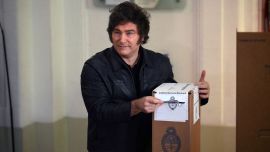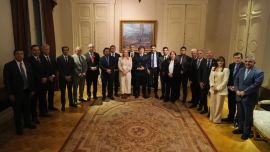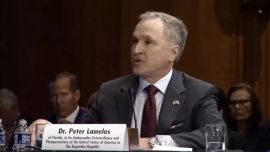Last Sunday, people voted with their guts, which is why, all by himself, the fiery ultraliberal nutcase Javier Milei narrowly beat the Juntos por el Cambio duo Patricia Bullrich and Horacio Rodríguez Larreta and, by a slightly wider margin, their Peronist counterparts Sergio Massa and Juan Grabois. Voters now have a couple of months in which to decide whether, in the presidential elections, which will be held on October 22 unless the government collapses before then, it would not be more advisable for them to make use of their heads. Attractive as letting Milei take a wrecking-ball to the established order may be, it would probably be better for most of the country’s inhabitants if someone a bit less eccentric but equally determined to undertake some sweeping reforms took charge.
As soon as the primary results began trickling in, many quickly came to the (let us hope premature) conclusion that Argentina would soon be governed by a man who, among other things, communes telepathically with his beloved dogs and regularly receives messages of support from long-dead economists of the Austrian School. In comparison with Milei, Donald Trump and Jair Bolsonaro are merely standard-issue politicians who enjoy making outrageous statements that upset their progressive foes and like to play fast and loose with the rules. As Lord Keynes, whom Milei detests, once remarked: “Madmen in authority, who hear voices in the air, are distilling their frenzy from some academic scribbler of a few years back.”
Has Argentina gone neoliberal? There are those who think that, having been ruined by a corrupt gang of populists who are skilled at using what here passes for State institutions to extract money from a docile population and funnel it into their bank accounts, she is about to put her faith in market forces and bow to their inexorable demands. In theory, the collective brain transplant some propose is much needed but, alas, there are plenty of practical difficulties whoever ends up in the Pink House will have to take into account because otherwise the country could die on the operating-table. Though public spending has to be slashed (not because people in love with some stern economic creed think it should be but because there is nothing much left in the kitty) there are millions of people who will be unable to survive for long without getting money from somewhere. Many such individuals are unaccustomed to working for a living and it will be very hard to make them understand that they themselves, not a solicitous national, provincial or municipal government or, failing that, come “social” organisation, should be responsible for their fate.
Patricia Bullrich, who roundly trounced Horacio Rodríguez Larreta in the Juntos por el Cambio primary, agrees with Milei that what the country needs is a radical overhaul, in order to rid it of the harmful rubbish which has piled up over the last century and prevents it from moving ahead. She will now have to persuade the many who supported the opposition coalition (until it became so obsessed with its own internecine conflicts that it lost contact with the rest of the population) that she, and the people surrounding her, will be able to do more or less what Milei says he would like without making an already fearsome crisis even worse.
This will be anything but easy. Thanks largely to the Buenos Aires City mayor, Juntos por el Cambio did its best to make itself look like a safe refuge for members of Argentina’s much derided “political class” or, as Milei, taking his cue from Spanish leftists, would have it, “political caste.” That particular strategy, based as it was on the notion that most professional politicos should close ranks behind him, must have cost it millions of votes.
In his defence, Rodríguez Larreta and his sidekicks can point out that if, as he did his best to arrange, the coalition had included the Córdoba province Peronist boss, Juan Schiaretti, among its prospective candidates, it would have amassed more votes than Milei, and that had this happened, Argentina’s immediate future would now look less scary than is currently the case. This may be true enough, but in the medium term, turning Juntos por el Cambio into something like a politicians’ trade union would probably have helped Milei rather more than it would have harmed him.
Meanwhile, Argentina’s economy continues its wild journey to an unknown destination. At the time of writing, the peso is in free-fall, neither shopkeepers nor their suppliers know how much to charge for the goods they sell, consumers are frantically trying to stock up as they did when hyperinflation was running amok and those who are already desperately poor fear they could soon be reduced to beggary. This means that Massa, who as well as aspiring to win the upcoming election is economy minister and, as though this were not enough, is also the country’s de facto president, is the proud owner of a poisoned chalice; he has got his hands on most levers of power, but though he pulls them this way and that, he cannot get the desired results.
The primaries did solve some problems, among them those caused by the fierce infighting among opposition hopefuls that led them to overlook what was happening elsewhere in the country, but in the excitement sparked by the results it was easy to forget that there are more than two months to go before the first round of the elections and that a great deal could change in the interim. If Massa somehow manages to ward off an economic implosion, and Bullrich falters by trying too hard to assuage the hurt feelings of her internal rivals and paying too little attention to what people are most worried about, he could claw his way back into the running. Though the foreign press sees him as the “centre-left” candidate, by temperament and nature he is just as “right wing” as his two opponents and, were he able to keep the leaderless Kirchnerites onside while about it, he could well do his best to outbid them in the coming weeks if only because a rapidly disintegrating economy will not leave him with any more appealing options.



















Comments